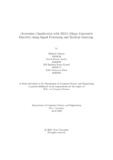| dc.contributor.advisor | Chakrabarty, Amitabha | |
| dc.contributor.author | Saleque, Shahriar | |
| dc.contributor.author | Spriha, Gul-A-Zannat | |
| dc.contributor.author | Kamal, MD Rasheeq Ishraq | |
| dc.contributor.author | Khan, Rafia Tabassum | |
| dc.date.accessioned | 2021-07-03T13:47:11Z | |
| dc.date.available | 2021-07-03T13:47:11Z | |
| dc.date.copyright | 2020 | |
| dc.date.issued | 2020-04 | |
| dc.identifier.other | ID 19341016 | |
| dc.identifier.other | ID 16301089 | |
| dc.identifier.other | ID 16101074 | |
| dc.identifier.other | ID 16301081 | |
| dc.identifier.uri | http://hdl.handle.net/10361/14724 | |
| dc.description | This thesis is submitted in partial fulfillment of the requirements for the degree of Bachelor of Science in Computer Science and Engineering, 2020. | en_US |
| dc.description | Cataloged from PDF version of thesis. | |
| dc.description | Includes bibliographical references (pages 54-61). | |
| dc.description.abstract | Depression is accorded as one of the leading causes to all the problems related to
mental health in the Global disease burden study (GBD). Major depressive disorder
(MDD) is when this depression reaches to a larger extent, when depression persists
for two weeks or more. Sadly, many individuals of our society tend to neglect
depression and refuse to label it as a mental disease and has a tendency to not seek
medical help. Not only this, they are being curbed because of the few or very limited
biological indicators for MDD and depression identification. Our main objective is
to develop a non-intrusive approach that will detect and differentiate brain signals
of patients with MDD from healthy patients. We were able to obtain an optimized
model with an accuracy of (82%). Primarily we obtained a raw EEG data-set upon
research and since it matched our requirements, we performed noise removal on
them. Afterwards we extracted relevant features for depression detection, such as
one feature was Absolute delta power. Finally, we entered these features into three
classification algorithms; Logistic Regression (LR), Support Vector Machine (SVM)
and Negative-Bayes (NB). To check the accuracy and precision, we performed a ten-fold
cross validation on them. Hopefully, our results will encourage and motivate people
suffering from this to seek the proper and effective medical help and to eradicate
the negative stigma around it. | en_US |
| dc.description.statementofresponsibility | Shahriar Saleque | |
| dc.description.statementofresponsibility | Gul-A-Zannat Spriha | |
| dc.description.statementofresponsibility | MD Rasheeq Ishraq Kamal | |
| dc.description.statementofresponsibility | Rafia Tabassum Khan | |
| dc.format.extent | 61 pages | |
| dc.language.iso | en | en_US |
| dc.publisher | Brac University | en_US |
| dc.rights | Brac University theses are protected by copyright. They may be viewed from this source for any purpose, but reproduction or distribution in any format is prohibited without written permission. | |
| dc.subject | MDD | en_US |
| dc.subject | Absolute delta power | en_US |
| dc.subject | LR | en_US |
| dc.subject | SVM | en_US |
| dc.subject | NB | en_US |
| dc.subject | EEG | en_US |
| dc.subject.lcsh | Machine learning. | |
| dc.subject.lcsh | Image processing. | |
| dc.title | Depression classification with MDD (Major Depressive Disorder) using signal processing and machine learning | en_US |
| dc.type | Thesis | en_US |
| dc.contributor.department | Department of Computer Science and Engineering, Brac University | |
| dc.description.degree | B. Computer Science | |

